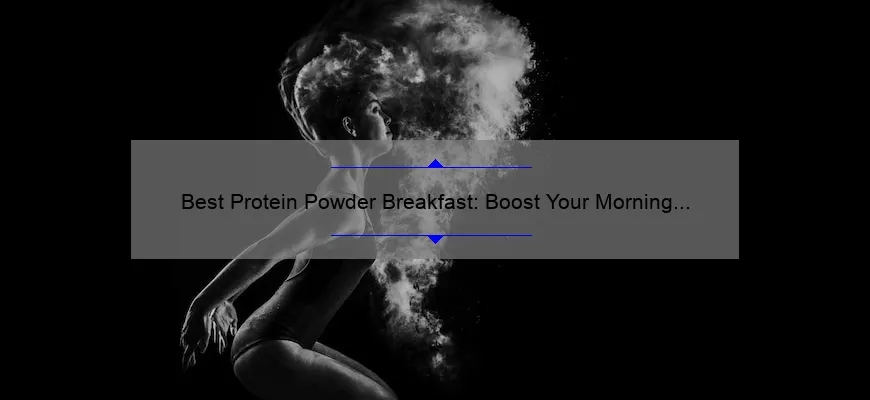Short answer best protein powder breakfast:
Protein powder can be a convenient and nutritious addition to your breakfast routine. Some top options include whey, casein, and plant-based powders such as pea or soy protein. Combining it with fruits, oats, or yogurt can create a well-rounded morning meal that supports muscle recovery and keeps you feeling satisfied throughout the day.
Is it necessary to consume protein powder for breakfast, or can I get enough protein from other sources?
Is it necessary to consume protein powder for breakfast, or can I get enough protein from other sources?
Protein powder has become popular among fitness enthusiasts as a quick and convenient way to increase their daily protein intake. While it may seem like an easy solution for getting sufficient protein, the truth is that there are plenty of other food sources available that can provide you with the same benefits.
Here are three alternative options to consuming protein powder:
1. Greek Yogurt: With around 17 grams of protein per serving, Greek yogurt is not only high in this essential nutrient but also packed with probiotics which promote healthy digestion.
2. Eggs: A single large egg contains approximately 6 grams of complete proteins along with various vitamins and minerals crucial for maintaining good health.
3. Quinoa: Known as a superfood grain due to its impressive nutritional profile, quinoa offers about 8 grams of plant-based proteins per cooked cup.
It’s important to note that consuming a diverse range of whole foods throughout the day will help ensure you meet your recommended daily allowance (RDA) without relying solely on supplements such as powders or shakes. Here are some additional natural sources rich in proteins:
4. Lentils: Containing around 18 grams per cooked cup, lentils offer both fiber and antioxidants while being low in fat.
5 Chicken breast: This lean meat provides up to 24-28 grams depending on how it’s prepared – whether grilled or roasted – making chicken breast one ideal choice if consumed within moderation
6.Greek yoghurt topped salad : It combines leafy greens full of calcium and iron , when added mushrooms contain nutrients including B vitamins As well scoop greek yoghurt containing upto20gms Proteins over lettuce adds extra punch
In conclusion, while using protein powders can be helpful especially during hectic mornings where time is scarce, consuming enough protein for breakfast is possible through a well-balanced diet that incorporates various food sources. By focusing on whole foods such as Greek yogurt, eggs, quinoa, lentils and chicken breast or by making greek yoghurt topped salads ,you can easily obtain the necessary amount of protein to support your body’s needs. So while protein powder can be convenient it’s important to remember other options are available for getting all the proteins needed – naturally!
– This common question arises due to the popularity of protein powder as a convenient and quick source of protein. Many individuals are curious about whether relying solely on this supplement is essential or if they can obtain sufficient amounts of protein through regular food sources alone.
Protein powder has gained popularity as a convenient and quick source of protein. This leads many individuals to wonder whether they need to rely solely on this supplement or if they can get enough protein from regular food sources alone.
1. Firstly, it is important to note that protein powders are not essential for meeting one’s daily protein needs. Regular food sources such as meat, fish, dairy products, legumes, beans, and even certain vegetables contain significant amounts of protein that can help meet the required intake.
2. Protein powders offer convenience in terms of preparation and portability – simply mixing them with water or milk creates an instant high-protein shake suitable for post-workout recovery or easy meal replacement.
3. Another benefit of using whey-based proteins (a common type found in most supplements) is their rapid absorption rate by the body compared to whole-food proteins which take longer digestion time before being absorbed completely; however this advantage may not be significant enough for everyone’s dietary requirements.
4. Additionally Best-selling brands often undergo rigorous quality testing processes ensuring purity standards while also offering various flavors enhancing taste profile much more than usually bland/plain natural foods containing same level per se serving size ratio comparison between equal weight due ingredients composition variations would difference might factored allowance calorie count total dieting plan regulated under controlled conditions calorie restrict along achieving other supplementation goals prevent users exceeding desired allowed-requirements limit restrictions represent potential health risks affecting sensitive populations diabetics gluten-allergic lactose-intolerant
please always consult healthcare professional guidance specific requests
In conclusion,
protein powder offers convenience but is not necessary to obtain sufficient amounts of
protein since regular food sources provide adequate nutrition.
What should be considered when selecting the best type of protein powder for breakfast?
Protein powder is a popular choice for breakfast because it provides an easy and quick way to boost your protein intake. However, with so many options available in the market, selecting the best type of protein powder can be overwhelming. Here are some factors to consider before making a decision:
1. Source: Protein powders can be derived from various sources like whey (from milk), soy, pea, or rice. Consider your dietary needs and preferences when choosing between animal-based or plant-based proteins.
2. Ingredients: Read the label carefully! Look out for added sugars, artificial flavors/colors/preservatives that may not align with your health goals.
3. Nutritional profile: Check the nutritional information including serving size, calories per serving, fat content (especially if you’re watching fat intake), carbohydrate amount (if following a low-carb diet), and naturally occurring vitamins/minerals present in each option.
Now let’s dive deeper into specific considerations:
4.Weight Loss Goals – If weight loss is on top of your mind then choose a protein powder lower in calories (<150 kcal/serving) and carbohydrates (20g). Whey isolate/casein blends have shown better results than others as they provide essential amino acids at optimal levels speeding up muscle repair process.
6.Digestive Sensitivity/Vegan Diet – Individuals experiencing lactose intolerance should go dairy-free by using vegan alternatives such as hemp or pea based proteins.Powdered collagen sourced from marine animals like fish helps improve skin elasticity strengthens hair nails due high concentration glycine proline amino acid chains
7.Flavor Preferences/Taste Preference – Some people might find certain types more palatable compared to others. Experiment with different flavors and brands till you find one that suits your taste palate.
In conclusion, the best type of protein powder for breakfast depends on several factors such as dietary needs, goals, ingredient preferences while keeping in mind any allergies or sensitivities. Remember to consult a healthcare professional before making significant changes to your diet routine!
– With numerous types and brands available in the market, people often seek guidance on how to choose the most suitable option for their breakfast routine. This query typically revolves around factors like dietary restrictions, personal goals (muscle gain vs weight loss), taste preferences, allergen concerns, affordability, absorption rate by the body etc., all contributing towards finding an optimal choice among various options like whey isolate versus plant-based proteins such as soy or pea.
With so many options available in the market, choosing a suitable protein for breakfast can be overwhelming. Factors like dietary restrictions, personal goals, taste preferences, allergen concerns, affordability and absorption rate all play a role in finding the optimal choice.
1. Consider your dietary restrictions.
2. Determine your personal goals – muscle gain or weight loss?
3. Take taste preferences into account.
4. Check for allergens that may cause discomfort.
5. Consider the affordability of different protein options.
Choosing between whey isolate and plant-based proteins such as soy or pea is another decision to make based on these factors:
– Whey isolate: A popular choice due to its high-quality amino acid profile and quick absorption by the body.
– Soy protein: Suitable for vegetarians/vegans; contains all essential amino acids but may have an earthier flavor some people enjoy less than others
– Pea protein: Another option suitable for vegans; rich in lysine but lower amounts of cysteine/methionine compared to animal-based varieties
In conclusion, when selecting a breakfast protein source it’s important to consider factors like dietary restrictions,stated nutritional aims/taste inclinations/allergies/cost considerations whilst comparing & contrasting products e.g., whey versus plant-based alternatives depending upon individual circumstances/goals/preferences/budgets you might come across differing outcomes ultimately leading towards achieving best results tailored specifically according one’s own conditions/situations pleasantly!






